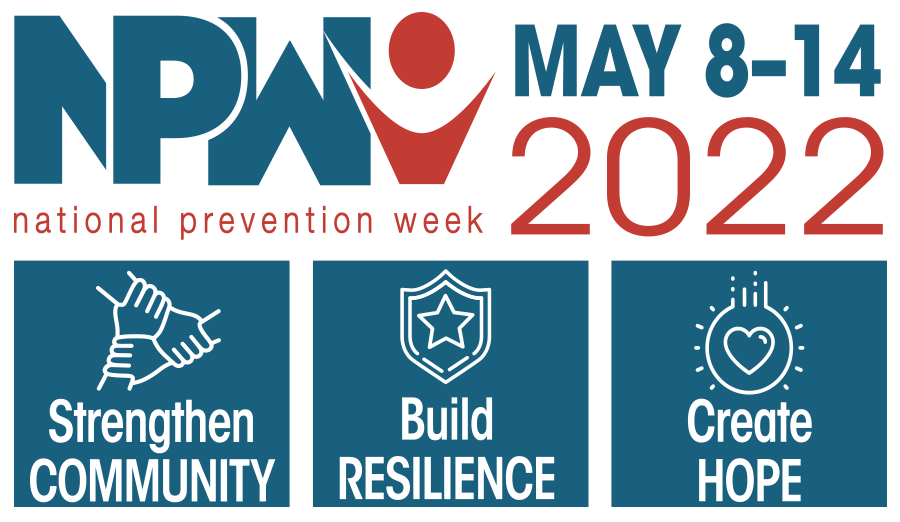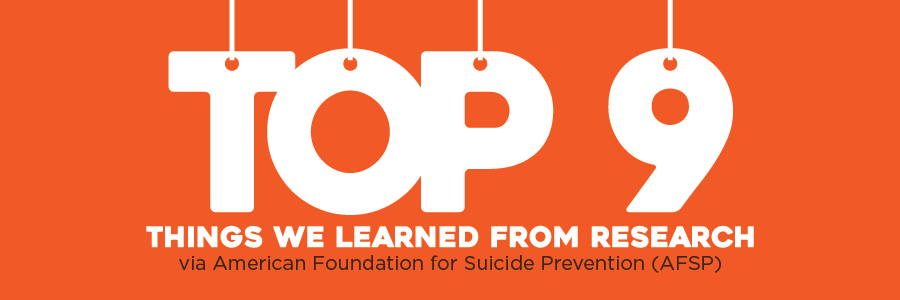NATIONAL PREVENTION WEEK 2022

National Prevention Week (NPW), held May 8-14th, is a national public education platform bringing together communities and organizations to raise awareness about the importance of substance use prevention and positive mental health.
SAMHSA’s prevention day was on May 9th during which they held a virtual event with several guest speakers. On May 10th, SAMHSA held a virtual town hall meeting on underage drinking.
The three primary goals of National Prevention Week are to:
- Involve communities in raising awareness of substance use and mental health issues and in implementing prevention strategies, and showcasing effectiveness of evidence-based prevention programs;
- Foster partnerships and collaborations with federal agencies and national organizations dedicated to improving public health; and
- Promote and disseminate quality substance use prevention and mental health promotion resources and publications
National Prevention Week (NPW) is held each year during May. Originally, SAMHSA chose this timing because it is near the start of summer, an important time for school, communities, and prevention professionals to re-focus on prevention. Adolescents and full-time college students most often use substances for the first time during June or July, according to SAMHSA’s National Survey on Drug Use and Health (NSDUH) data on adolescents – 2012 (PDF | 704 KB) and NSDUH data on full-time college students – 2015 (PDF | 1.2 MB).
As national participation in NPW has increased over the years, this week now serves as a week-long observance created by SAMHSA to celebrate prevention efforts in organizations and communities across the nation, and across all ages. We know communities make prevention happen every day – not just during NPW – and NPW is the perfect time to promote and celebrate a year’s worth of prevention efforts, as well as get news, ideas, and resources to strengthen daily, weekly, and monthly prevention activities.
Plus, the timing of National Prevention Week still provides a timely opportunity for schools and organizations to host prevention-themed events and activities before the school year ends, raising awareness about this important issue among students and their families. These are key periods of social transitions, a risk factor for youth substance use, and an opportunity to develop or strengthen the community, school, and family bonds that protect young people from substance use and strengthen community health overall. More information can be found in The Surgeon General’s Report on Alcohol, Drugs, and Health.
Find out more about National Prevention Week by visiting: https://www.samhsa.gov/prevention-week/about
How did the state of Georgia participate in National Prevention Week? GUIDE INC participated by promoting NPW through the steps of G-U-I-D-E or
- G – Get involved in your local community.
- U – Understand the facts about substance abuse and help spread the word.
- I – Invest in programs that support prevention.
- D – Discover new ways to stay active and healthy.
- E – Encourage the youth in your life to make healthy decisions and engage in positive extracurricular activities.
SUICIDE PREVENTION

- Suicide is related to brain functions that affect decision-making and behavioral control, making it difficult for people to find positive solutions
- Limiting a person’s access to methods of killing themselves dramatically decreases suicide rates in communities
- Ninety percent of people who die by suicide have an underlying — and potentially treatable — mental health condition
- Depression, bipolar disorder, and substance use are strongly linked to suicidal thinking and behavior
- No one takes their life for a single reason. Life stresses combined with known risk factors, such as childhood trauma, substance use — or even chronic physical pain — can contribute to someone taking their life
- Asking someone directly if they’re thinking about suicide won’t “put the idea in their head” — most will be relieved someone starts a conversation
- Certain medications used to treat depression or stabilize mood have been proven to help people reduce suicidal thoughts and behavior
- If someone can get through the intense, and short, moment of active suicidal crisis, chances are they will not die by suicide
- Most people who survive a suicide attempt (85 to 95 percent) go on to engage in life
For the complete list visit: https://afsp.org/what-we-ve-learned-through-research

ADVOCACY
The update below provides readers with the bill numbers, resolution numbers, descriptions and status of Georgia Senate and House, bills and resolutions as of June 6, 2022
A bill becomes an act when the Governor signs it into law. Following the last day of the legislative session which was April 4, 2022, known as “sine die,” bills typically are signed into law or vetoed by the Governor in April and May.
Bills below that passed both Chambers (the Senate and the House) and were signed by the Governor will become part of Georgia law as of July 1, 2022, unless the bill itself indicated a different date.
The legislation below concerns subjects such as alcohol, prescription drugs, marijuana, vaping, substance abuse, suicide prevention and mental health. Some mental health legislation is included since it often impacts both substance abuse and suicide prevention.
The bill and resolution topics listed above appear in bold print in the descriptions below to make them easier to find.
The link to take you to information regarding each bill and resolution on the Georgia General Assembly’s website https://www.legis.ga.gov/ is provided below the bill or resolution itself.
Please send any questions you may have to Dr. Gregg Raduka at graduka@livedrugfree.org.
Legend:
SB: Senate Bill |
HB: House Bill |
SR: Senate Resolution
HR: House Resolution
Substance Abuse and Suicide Prevention and Treatment
HB 1013 (Mental Health Parity Act) passed both Chambers on a unanimous and bi-partisan basis and was immediately signed into law by the Governor. The bill seeks to ensure that treatment for mental disorders and substance abuse and dependency receive increased coverage from insurance companies.
https://www.legis.ga.gov/legislation/61365
Alcohol
There were no alcohol-related bills that passed both the House and Senate this session. The only alcohol bill that was heard by a Committee was SB 420, which proposed to allow breweries to sell direct-to-consumer with no daily limit. Currently breweries may only sell 1 case per day directly to consumers.
The bill was sponsored by Sen. Chuck Hufstetler with support from beer manufacturers (breweries). It was opposed by Georgia Beer Wholesalers, the Georgia Baptist Mission, and the Georgia Alcohol Policy Alliance. The bill never came to a vote within the Senate Regulated industries Committee despite three public hearings.
https://www.legis.ga.gov/legislation/61566
Marijuana
Although not considered in the legislature, there was a non-binding question asked on the Democratic ballot in the May 24, 2022 primary election concerning recreational marijuana. See below for the question and ballot results.
A Resolution (HR 798) passed the House creating the House Study Committee for Cannabis Waste Disposal and Recycling. The 6 marijuana greenhouses allowed by Georgia law will very likely produce more marijuana than is needed for the THC products that will be consumed by patients on the GA THC registry.
The Committee will study possible uses for the waste related to the Cannabis Sativa plant possibly including products such as “ . . .hemp, CBD oil and products, medical products, and various derivatives, extracts, cannabinoids, isomers, acids, salts, and salts of isomers . . .”
https://www.legis.ga.gov/legislation/62142
Although a number of bills regarding marijuana were introduced this session, none of these bills passed both the House and Senate. The major marijuana bill ended up being in the form of a Conference Committee Report re: Senate Substitute for House Bill 1425 (HB 1425 Sub.)
Although it passed the House it was tabled by the Senate on the night of April 4th, the last night of the session and so it died. The major objective of the bill was to increase the number of production licenses which allow a company to cultivate marijuana and manufacture THC products in Georgia.
The bill was an attempt to award licenses to some companies whose proposal to obtain a production license did not score high enough to be able to receive one of the 6 licenses to be awarded by the GA Access to Medical Cannabis Commission.
https://www.legis.ga.gov/legislation/62269
Opioids
SB 500 passed both Chambers and was signed by the Governor. The bill barred local governments from suing the opioid industry in cases where the state was pursuing opioid litigation against that company or companies. This provides a unified statewide settlement structure to help ensure that such cases are settled sooner and in a more unified fashion.
https://www.legis.ga.gov/legislation/62029
HB 1559 would have shored up a pharmacist’s ability to provide opioid antagonists, such as Narcan, to patients. It also would have allowed pharmacists to provide patient counseling to the individual on how to use the opioid antagonist in the event of an overdose. The bill was tabled by the Senate on the last night of the session.
https://www.legis.ga.gov/legislation/62799
Psilocybin
HR 896 Sub sought to create the House Study Committee on Alternative Post-Traumatic Stress Disorder [PTSD] Treatment Resources for Veterans.
Although the resolution unanimously passed the Committee it was not voted on by the House. The major component of the bill was to study using psilocybin, a psychedelic drug found in certain mushrooms, to treat depression and PTSD in veterans.
https://www.legis.ga.gov/legislation/62532
Suicide
HB 1005 would have required local school systems to require every student age 8 through 18 to undergo a suicide screening at the beginning of each school year. The bill read, “The Department of Education, in consultation with the Department of Behavioral Health and Developmental Disabilities, the Suicide Prevention Program established pursuant to Code Section 37-1-27, and suicide prevention experts, shall develop or identify one or more age-appropriate screening tools. Local school systems shall refer any students, as appropriate, to mental health services or programs based on the results of the screenings.”
The bill was heard by a House Committee but did not pass in Committee.
https://www.legis.ga.gov/legislation/61335
Vaping
HB 1348 was tabled by the Senate on the last night of the session. It would have made (1) vaping in restricted areas a misdemeanor punishable by a fine (2) operators of early care and education programs post signs prohibiting vaping (3) vaping in designated smoke-free areas prohibited and would have provided that “No Smoking” signs may include the words “or Vaping”.

YOUTH
Voices for Prevention (V4P) will be hosting a Youth Summit on Saturday, July 30, 2022, from 12- 3pm at the Clarence Brown Conference Center in Cartersville, GA.
Join V4P for a day of game and prizes- which include White Water passes and Beat EarPods, a live DJ, and special guest emcee Mikeith Teague from POWER 96.1 / WWPW-FM / Atlanta. This event will celebrate the kickoff of the Youth Advocacy Project. This project aims to teach youth about advocacy, substance abuse prevention, suicide prevention, and mental health promotion.
The Youth Advocacy Project will allow students the chance to earn the Advocacy Ambassador Certificate which can be used on college applications or resumes. The Advocacy Ambassador Certification is intended for those interested in Substance Abuse Prevention, Suicide Prevention, and Mental Health Advocacy. This certification will prepare and empower youth to engage in advocacy at the local, state, and national levels.
To register, go to https://v4pga.org/yap/
We will choose one lucky winner from the first 100 youth to register for a $50 Amazon gift card.
If you are interested in bringing a youth action team or youth group, please email us at voices4preventionga@gmail.com
ANNOUNCEMENTS
V4P wants to hear from you.
Youth Action
Teams
Register for our
Youth Summit
Share with V4P
Our readers come to V4P to hear and learn what is happening in the world of suicide prevention and substance abuse prevention. We strive to gain as much information as possible to share with V4P members and others across the state because knowledge is power.
V4P wants to hear from you! We invite you to let us know if you are having any future advocacy events, whether it’s a webinar or virtual event that is open to the public that you would like to share. We call on our youth to send in articles and input for ways we can advocate for suicide prevention and substance abuse prevention. If you know of any Office of Behavioral Health Prevention and Federal Grants (OBHPFG) provider activity updates for the state of Georgia, please share them. We encourage all members to let us know if you have any accomplishments of individual members and member organizations that you would like to announce. Click the link below to share and we look forward to hearing from you
V4P Free Membership
To become a member with V4P is free. Membership includes exclusive webinars, networking opportunities, and much more. You can also be involved with V4P events via our social media accounts. Our social media handle on Instagram, Twitter, and Facebook is V4PGA. So, click that follow button and be a part of the V4PGA experience!

Upcoming Events
July
July 14- V4P Webinar with Dr. Michael Davis (@2:00)
July 17 – 23 – CADCA Midyear Conference
July 24: International Self-Care Day
July 30: Youth Advocacy Summit (12:00 – 3:00)
August
August: V4P Member Call (@ 2:00)
August 28- September 1: Georgia School of Addiction Studies
September
September: National Suicide Prevention Month
September 4-10: National Suicide Prevention Week
September 10: World Suicide Prevention Day
Inspirational Thought
Well, here we are at the mid-way point of 2022. We are in the 2nd half!
Perhaps you are on target with your goals, perhaps you are not. This is just a quick reminder that no matter where you are in the journey, each day is a new day to show up and do your best.
Some days your best may be taking a group of youth to a prevention event. Other days, your best may be sending off that report or responding to several emails and phone calls. And then other days, your best may be taking a shower and putting on something other than sweats.
Every day isn’t rainbows and sunshine, but every day is an opportunity. So by my calculations, you’ve got about 190 opportunities left in this year.
Stay the course. Keep showing up. You matter. Your work matters. You’re doing great. Here’s to an amazing second half!

Check out DBHDD’s Resiliency Toolkit website for more ways to connect and reenter “outside” after the pandemic. https://resiliencytoolkit.org/

